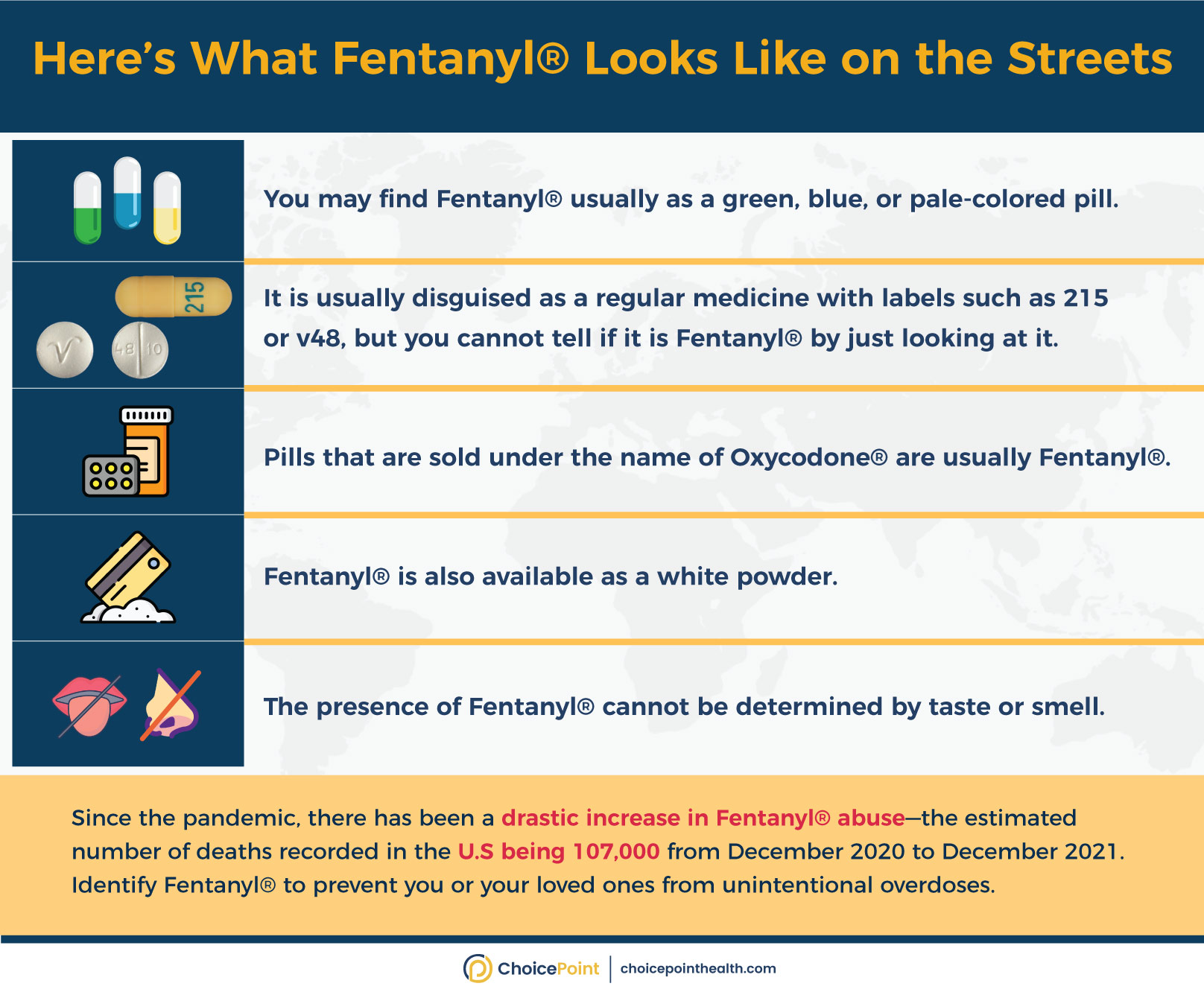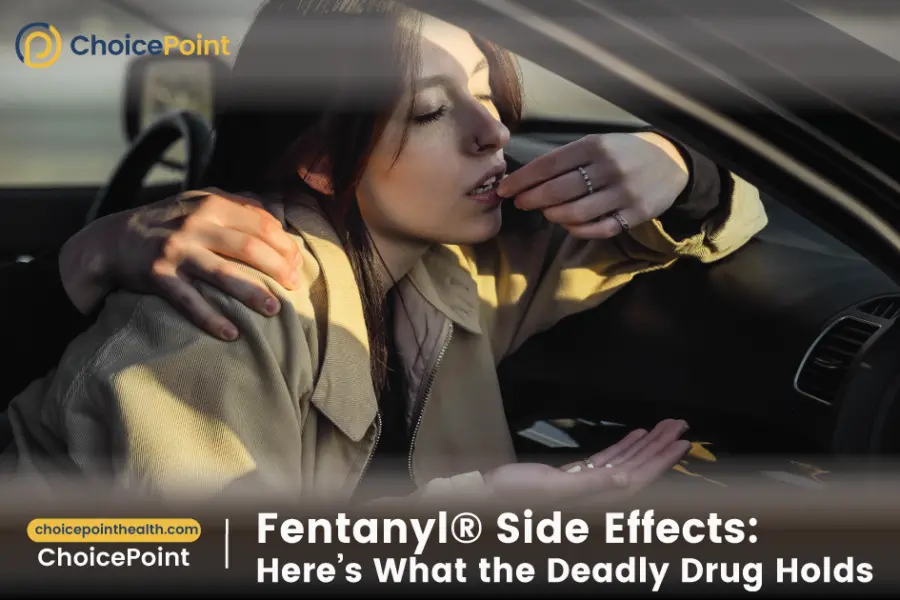Originally formulated as a painkiller, Fentanyl® has become one of the most popular drugs sold on the streets. Research that observed Fentanyl® seizures from 2016 to 2021 showed that there had been a rise in overdose cases, most of which were unintentional. What makes Fentanyl® more harmful is that it is mixed with other drugs, and people are not even aware of it, which may result in deadly Fentanyl side effects.
If you or your loved ones suffer from Fentanyl side effects, contact ChoicePoint at 844.445.2563 or by filling out this form.
Table of Contents
What is Fentanyl®? What Are the Side Effects of Fentanyl?
Fentanyl® is a synthetic opioid employed and prescribed to manage extreme pain. It is considered to be almost 50 to 100 times more potent than Morphine. In the palliative care departments, it is commonly employed as:
- An injectable, i.e., with the help of a syringe
- Oral medication
- A spray
- Transmucosal lozenge
Because Fentanyl® is quite potent, it is used with care and in extreme cases. However, when used illegally or as a recreational drug, it is taken in:
- Powdered form
- As a pill
Commonly, Fentanyl® is combined or substituted with heroin when used or manufactured illegally. Because it is mixed with strong drugs, Fentanyl’s side effects may also include death and coma. Therefore, overdosing on Fentanyl® is relatively easy, as 2 mg of Fentanyl® can be fatal, and as much as 5 mg is added to the pills that are sold on the streets.
Fentanyl Side Effects, Withdrawals
Fentanyl®, being a potent drug, instigates areas of the brain that are responsible for emotions. The sudden outburst of happiness hormones is the reason people enjoy consuming Fentanyl®. However, Fentanyl side effects are quite strong and alarming. These are:
- Nausea
- Drowsiness
- Constipation
- Tolerance addiction
- Euphoria
- Confusion
- Respiratory depression
- Urinary retention
- Unconsciousness
- Coma
Fentanyl® is a potent drug; its abuse can easily lead to death. Therefore, it is recommended to stop the non-medical use of Fentanyl® immediately. If putting a stop to this practice is difficult for you, contact ChoicePoint as we offer personalized addiction treatments that will cater to your needs as an individual. Contact us at 844.445.2563 or complete this form to undergo Treatment with our DEA-certified doctors.
Samantha Socarras, our clinician, says, “Treatment is always better than fearing stigma and holding yourself back. Most of my patients tell me before undergoing the Treatment that they had completely lost hope in going back to living normally. It changed, however, and I tell them it always changes.” Further, Samantha explains, “I cannot be happier that we could contribute to giving somebody hope by empowering them.“
How Long Does Fentanyl Withdrawal Last?
When a person stops taking Fentanyl®, or any other drug, they can encounter troubling Fentanyl withdrawal symptoms, especially in the first few days. However, withdrawal symptoms are different for everyone and depend on various factors. If you want to know about the fentanyl withdrawal timeline, we have outlined it for you:
Early Symptoms Show up for around 2 to 4 Hours
The early signs of Fentanyl withdrawal symptoms include:
- Persistent yawning
- Bodily pain
- Chills
- Anxiety
- Strong urge to consume Fentanyl®
- Agitation
Severe Symptoms Start after 24 to 36 Hours
Commonly, the symptoms that appear 24 to 36 hours after the last dose are severe. These symptoms can last for about a week. Most of the signs in this phase include high severity of the existing ones. Additional symptoms are:
- Fever
- Vomiting
These Fentanyl withdrawal symptoms are more likely to require medical care to be dealt with.
Long-term Symptoms
The long-term Fentanyl withdrawal symptoms appear weeks after having undergone professional Treatment. They could reoccur and cause the following problems:
- Disruptive thoughts
- Depression
- Mood disorders
- Trouble sleeping
How long does Fentanyl stay in your system? Read this article here.

Detecting Fentanyl®
How to Combat Fentanyl Side Effects: Treatment Options
Because Fentanyl® is an opioid, it can be treated with a combination of:
a) Detox Addiction Treatment Program
Detox treatment involves the detoxification of toxins from the body of someone with addiction problems. This is one of the effective ways to eradicate such substances that have the potential to harm a patient both physically and mentally.
A detox program can help with the following:
- Fentanyl Withdrawal symptoms
- Recurring urges
We have studied that Fentanyl® is highly addictive, and patients can feel the urge to consume it within 24 hours of staying away from it. Therefore, managing Fentanyl withdrawal symptoms with the help of detox is essential to prevent the patient from relapsing.
b) MAT Program
Medication-Assisted Treatment (MAT) programs are considered effective for those with opioid use disorder (OUD). With the help of certain medicines, such as Suboxone®, the urge to consume Fentanyl® that results in severe Fentanyl side effects can be combated.
At ChoicePoint, we employ FDA-approved medicines in our MAT program to fight off OUD. The medications used to treat Fentanyl® dependence are:
These medicines not only help recover but also minimize fentanyl side effects. The medications mentioned above are coupled with the following therapies to achieve the best results among those suffering from addiction.
- Cognitive-Behavioral Therapy Program
- Dialectical Behavior Therapy Program
- Group Therapy Program
- Individual Therapy Program
- Family Therapy Program
Treatments that include programs like group therapy may increase the chances of a better recovery because your commitment remains intact with the help of other medical professionals and people to whom you can relate.
Don’t let Fentanyl® Get the better of you.
Fentanyl side effects can be long-lasting as opioids have the potential to modify your brain’s functionality. Without the help of medical professionals, overcoming Fentanyl addiction can be quite difficult. Moreover, refraining from professional assistance can have dreadful consequences. So, if you or a loved one are battling Fentanyl addiction, remember that seeking help is imperative. The earlier you reach out for Treatment, the better.
Medical Disclaimer:
ChoicePoint aims to improve the quality of life for people struggling with substance use disorder and mental health issues. Our team of licensed medical professionals research, edit and review the content before publishing. However, this information is not intended to be a substitute for professional medical advice, diagnosis, or treatment. For medical advice please consult your physicians or ChoicePoint's qualified staff.










Review Fentanyl Side Effects: Here’s What the Deadly Drug Holds.